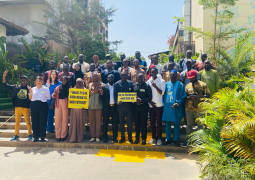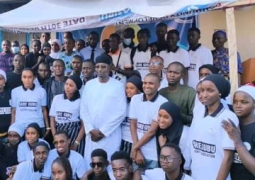
The community advocacy targets chiefs, village heads, women leaders, girls and community-based facilitators in a bid to reflect on the processes of change and the various perspectives on the law criminalising and prohibiting FGM in The Gambia.
The project, funded by Canada Fund for Local Initiatives (CFLI) through the Canadian Embassy based in Dakar, was centered on promoting the sexual and reproductive health rights (SRHRS) of Women and Girls in The Gambia.
The initiative is part of a broader advocacy and rights education with a view to attaining 2030 and 2063 goals.
At the event, Pierre Bah, Chief of Niani, lauded their effort in promoting the Sexual and Reproductive Health Rights (SRHRS) of women and girls.
The project, Chief Bah added, is part of gender equality and the empowerment of women and girls, adding that even though women constitute over 51% of the population, they are poorly represented in parliament.
Therefore, he said, those who are given the opportunity should promote and protect the rights of women and girls.
Dr. Isatou Touray, Executive Director of GAMCOTRAP, gave a brief background of the project and the reason why it focuses on the CRR and NBR of The Gambia.
She lauded the participation of people comprising various target groups during the activities conducted in the Central River Region and North Bank Region.
The project, she added, is to ensure and promote the SRHRs of women and girls in The Gambia through advocacy and rights education, with a focus on envisioning 2030 and 2063 goals.
Dr. Touray added that the project envisions a future where women and girls are allowed to reach their full potential and feel empowered to lead through comprehensive rights education and collaboration with diverse stakeholders.
She reiterated that, FGM, child marriage and gender stereotypes are prevalent in The Gambia and affirmed that women must not be deceived by ‘our some religious scholars’ who do not have deep knowledge about the Quran and Hadith and no background on the health implications of FGM.
“GAMCOTRAP has been engaging the people in a series of advocacies in all the regions and educating the people about the effects of FGM on SRHRs of women and girls.” she said.
She informed participants about the current situation where few parliamentarians and religious leaders want to repeal the country’s anti-FGM Laws.
“The NAMS are representing the people and they are the voice of the people. It’s their primary responsibility to protect the rights of women and girls.” she told participants.
Isatou Barry, a participant, thanked GAMCOTRAP and partners for coming to their aid, further expressing her resolve to stand by the law banning FGM in The Gambia and ‘if our National Assembly members agree to repeal this law, we will not give them our votes.’
“We do not agree on the repeal of the FGM bill as it’s against the rights of women and girls. Men must respect women and why do the NAMs want to repeal these laws. This is an issue that affects women’s reproductive organs, health and their body, so it’s violating our rights and there is health implication in FGM. We will not go back to the practices of FGM as we have given our word and have taken an oath not to go back to the cutting.”
Read Other Articles In National News



